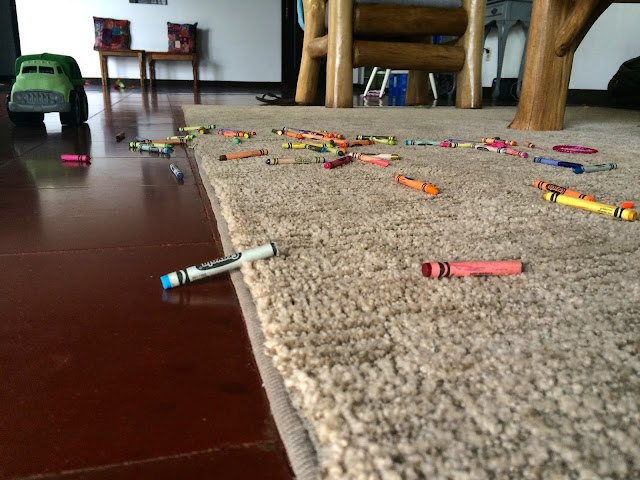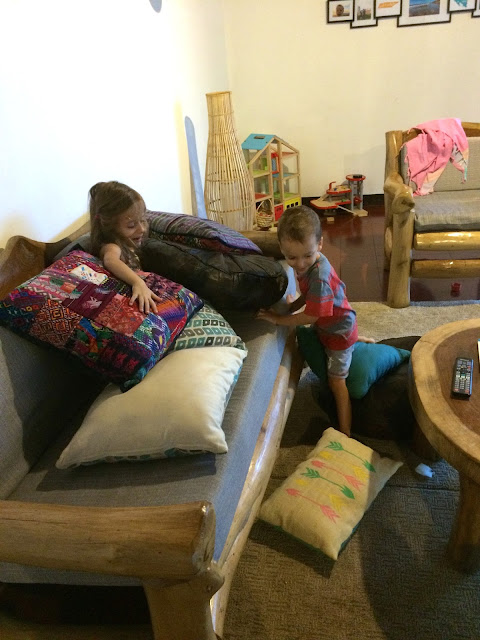So, these last few months, I’ve kinda been the new kid in town.
As PMI’s new Regional Director here in Managua, Nicaragua, I arrived in January with my wife, Holly, and our ever-so-cute 3-year old twins in tow. We walked off the plane, holding hands down the escalator and into our exciting new future in Nicaragua. Later that night at our new home, surrounded by twenty or so yet-unpacked duffel bags, and sitting cross-legged on the floor of our living room provisioned with pizza, popsicles and headlamps (the electricity was out for a few hours), Holly and I made a plan on how to settle into our new life.
 |
| The McCloud family on our first Sunday (ever) at a new church. For our whole life together (12 years!), Otter Creek Church has been home. |
That week, we started to check off all the things on the “set-up” list. House? Check. Vehicle? Check. Grocery store? Check. Church? Check. Pre-school for the kids? Check. Everything went very smoothly and before we knew it, we had the kids suited up in cute little school uniforms, bouncing off to make some new amiguitos.
But, as many of you know, schools, in general, are germ factories. The first week of classes, no matter where you are located, is a time of meeting new friends (and their germs) and building new knowledge (and immune responses). Our kids were no exception. They woke up a few days later with a fever, and it quickly became apparent that it wasn’t just a 24-hour bug.
Alas, the one thing that we didn’t have checked off our list was a doctor. Irony alert: my job is to set up health clinics in Nicaragua (In my defense, PMI doesn’t yet have any clinics here in Managua, where the central office is located).
After polling some of our new friends from church, we settled on a pediatrician whose office was located at the nicest, well-equipped hospital around. We wiped the kids’ noses, strapped ‘em into car seats and braved Managua’s grueling traffic, arriving on-time for our appointment.
The hospital was NICE. New construction, lots of glass, marble and steel. Our doctor’s offices looked copied and pasted right out of any major US hospital or medical park. Nice waiting room, chairs, magazines, flat-screen TVs on the walls, and completely empty, save for us.
We waited almost an hour past our appointment time in that empty waiting room. When the doctor was ready for us, we entered his office, and he took all the patient intake and vitals himself - no nurses or techs. Our case was pretty open and shut; most anyone could deduce from the various colors oozing from four little nostrils that the kids had sinus infections. Two bottles of (apparently yucky-tasting) antibiotic suspension and a prescription fever reducer later, we were good to go.
All in all, we paid around $100, or $50 per child for the visit, which is at the top end of what you would pay for a pediatric visit here in Managua, and also completely inaccessible to more than 90% of the Nicaraguan public (hence, the empty waiting room).
Driving away, I reflected back on the experience. I liked the pediatrician and would definitely take the kids back to him, if needed. I also know that the big, nice hospital we visited has many other excellent doctors and facilities, and it’s absolutely the place I would take my children in an emergency. But, as someone who knows something (yet still learning a lot) about primary care in Central America, the quality of the care and experience still left me feeling like I had mostly just paid for marble and glass.
For primary health care, I realized, (and as a part of the PMI team I was pretty proud to say) I would have rather taken my kids to a PMI clinic to see one of our doctors. They would have absolutely handled our case as well or better than this more expensive doctor did. The two clinic visits are even comparable; PMI’s clinics aren’t over-the-top fancy, but they are attractive spaces, nicely appointed with clean tile floors, comfy chairs (not to mention a flat screen in the waiting room!). But then again, you’d never get to watch it, because when a patient shows up at one of our clinics, they are immediately attended to by our full staff of nurses, doctors, pharmacists and admins. We’ve got the full suite of laboratory testing and exam technology that most primary/urgent care patients need. And the current cost for a general patient consult at PMI’s Nicaraguan clinics? About $4.00 or less.
Imagine the picture; a rich Gringo electing to take his sick children to the same clinic and doctor that a Nicaraguan mother who makes less than $5 a day can afford to bring her kids to!
Palmetto Medical Initiative exists to make high-quality health care (and specifically, primary care) accessible, affordable, and sustainable for the majority of the people in the world who can’t take their sick kids to a shiny marble and glass hospital on the rich side of town. We do it by finding donors who make initial investments to establish an excellent facility, and then we are as efficient as possible in running those clinics, finding talented, well-qualified medical professionals who are more passionate about public health than their own bottom line.
There will always be expensive, highly trained doctors and private, amazingly equipped hospitals for those who are able to pay top dollar. I am glad for that, and I count myself lucky to be one of the people who could access such a place. But make no mistake; quality CAN be affordable. Palmetto Medical Initiative’s success in treating thousands and thousands of patients in Uganda, Burundi, and Nicaragua over the last five years demonstrates that it is possible to provide high-quality, compassionate, affordable (and yet financially sustainable!) care to people who have very few resources; the very people who never could have accessed quality health care before, and who often need it most.
The best part is that while we’ve got multiple locations where our clinic model is already breaking down barriers to health care access, we’ve got lots more clinics we plan to open in the very near future.
Hi, we’re Palmetto Medical Initiative.
We’re the new kids in town, and we’re just getting started.





















.jpg)

.jpg)


.jpg)
.jpg)

